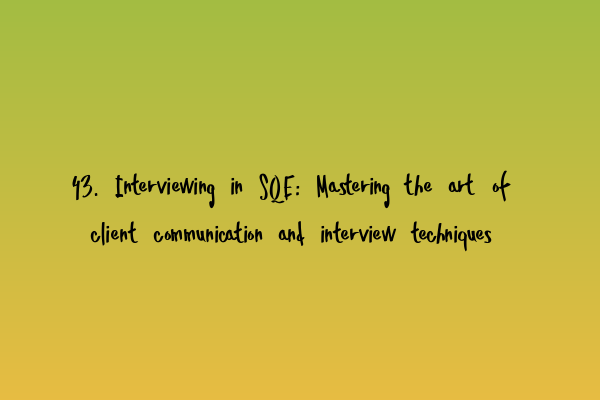43. Interviewing in SQE: Mastering the Art of Client Communication and Interview Techniques
As an aspiring solicitor, one of the essential skills you need to master is client communication. Effective client communication lays the foundation for building strong relationships, obtaining accurate instructions, and providing quality legal advice. Additionally, having excellent interview techniques is crucial for successful client interviews and securing clients in the competitive legal industry.
In this article, we will explore the key elements of mastering client communication and interview techniques in the context of the SQE exams. By understanding and implementing these strategies, you can enhance your chances of success in the SQE exams and in your future legal career.
1. Preparing for client interviews
Preparation is key when it comes to conducting client interviews. Prior to the interview, familiarize yourself with the relevant materials and gather all necessary information. This includes reviewing any legal documents, relevant case law, and understanding the client’s background and their legal issues.
As part of your SQE1 preparation, you can benefit from using interactive mock tests for SQE, which can help enhance your engagement and learning. By practicing in a simulated environment, you can gain valuable insights into how to handle different client scenarios and improve your interview techniques.
[Click here to learn more about interactive mock tests for SQE]
2. Active listening and effective communication
During client interviews, it is crucial to actively listen to the client’s concerns and objectives. Actively listening involves giving your full attention to the client, maintaining eye contact, and using appropriate non-verbal cues to show understanding and empathy.
Additionally, effective communication is vital to ensure that your clients understand the legal information you provide. Use clear and concise language, avoiding jargon whenever possible. Break down complex concepts into understandable terms and encourage clients to ask questions. By demonstrating effective communication skills, you can build trust with your clients and establish yourself as a competent and reliable solicitor.
3. Asking the right questions
When conducting client interviews, asking the right questions is essential to gather accurate and relevant information. Open-ended questions can encourage clients to provide detailed responses, while closed-ended questions can be useful for obtaining specific facts.
As part of your SQE2 preparation, practicing with SQE sample papers can help you refine your question-asking skills. By experiencing different scenarios and learning from model answers, you can improve your ability to ask the right questions during client interviews.
[Click here to access SQE sample papers and practice for exam success]
4. Demonstrating empathy and professionalism
Empathy is a crucial skill in client communication. Clients often seek legal advice during challenging times, and demonstrating empathy shows that you understand their emotions and concerns. Show empathy by acknowledging their feelings, providing emotional support, and offering practical solutions to their legal issues.
While empathy is important, it is equally essential to maintain professionalism in all interactions with clients. Present yourself in a courteous and respectful manner, adhering to the professional standards expected of a solicitor. Balancing empathy and professionalism will help you build strong client relationships based on trust and reliability.
5. Adapting to different client personalities
Every client is unique, and understanding their personality traits can help you tailor your communication style to their needs. Some clients may prefer a more formal and objective approach, while others may respond better to a more informal and empathetic approach.
In your SQE preparation, it is beneficial to focus on mastering key concepts in SQE1 and SQE2. By developing a solid understanding of legal principles, you can adapt your communication style to different client personalities confidently.
[Click here to explore the focus areas in SQE1 and SQE2 for mastering key concepts]
6. Handling challenging client situations
Client interviews may sometimes present challenging situations that require patience, tact, and effective problem-solving skills. Some clients may be anxious, angry, or uncooperative, and it is important to remain calm and professional in such situations.
One way to prepare for handling challenging client situations is by adjusting your SQE strategy based on mock performance. Identifying areas of improvement and practicing under exam-like conditions can help you develop the resilience and skills needed to handle difficult clients effectively.
[Click here to learn how to adjust your SQE strategy based on mock performance]
Conclusion
Mastering the art of client communication and interview techniques is crucial for success in the SQE exams and your future legal career. By preparing adequately, actively listening, using effective communication skills, asking the right questions, demonstrating empathy and professionalism, adapting to different client personalities, and handling challenging client situations, you can excel in client interviews and build strong client relationships.
Continue honing your skills by practicing with SQE sample papers, utilizing interactive mock tests, and focusing on mastering key concepts in SQE1 and SQE2. By integrating these strategies into your SQE preparation, you will enhance your chances of success and become a skilled solicitor with the ability to effectively communicate with clients and excel in your legal career.
